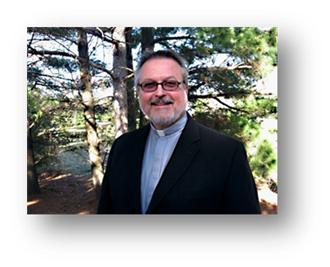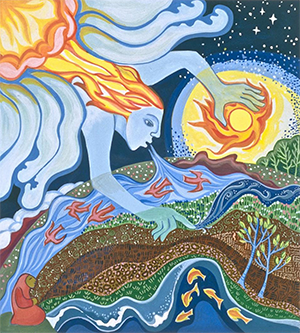“As I Live and Breathe!” by Rev. Fr. Yanchy Lacska
I grew up in the South and when someone was surprised by something they heard, they would often say, “As I live and breathe!” We are entering the season of Pentecost and it is the beginning of something surprising happening. On Pentecost Sunday we hear the story of the disciples of Jesus gathering together to celebrate Shavout, the Jewish festival of the giving of the law to Moses on Mount Sinai, when “Suddenly, there came from heaven a sound like a mighty rushing wind, and it filled the whole house where they were sitting” (Acts 2:2). In the Jewish Scriptures, the Hebrew word used for spirit is ruach. In the creation story, “The earth was chaos, darkness was on the surface of the deep, and the Ruach Elohim (Spirit of God) was hovering upon the surface of the water” (Genesis 1:2).
Besides spirit, ruach can mean wind, breath or life force. This gives us an image of the Spirit all around us and within us. In the creation story, it is this same Ruach Elohim that entered into the first humans and gave them life. We read, “And the Lord God formed the human and breathed into its nostrils the breath of life; and the human became a living soul.” We take for granted the miracle of breath that fills our lungs, and keeps our heart, mind, and entire body functioning from our first moment of life until our breath leaves us at our death.
This more expansive image of spirit and breath is not limited to Judaism and Christianity. Indeed, it is found in traditions all over the world. According to Navajo tradition, the Winds first appeared from the horizons of the four cardinal directions, and these Winds come to each child at the moment of birth, giving life. Soon after their birth, Navajo babies are presented to the four Winds by their parents to give thanks, symbolically reminding them that the life and breath that sustains them is the same life and breath that is the Holy Wind energizing the entire cosmos. The people of New Zealand and Hawaii, greet each other by touching foreheads and noses in a symbolic sharing of breath and life force they call ha. When Hawaiians greet each other saying aloha, they are sharing love, affection, peace, and the Spirit of Life that holds everything together.
The ancient Celts used the word awen. This word is formed by combining the two words, aw, meaning fluid or flowing, and en, meaning essence, inspiration and spirit. So awen literally means flowing spirit. Awen was adopted by early Celtic Christians to describe the role of the Holy Spirit. Like the Navajo Holy Wind, Awen is Divine Energy that surrounds and fills us with every breath, inspiring our minds and souls. With each breath we take, we are breathing in the Spirit of God, the breath that has given life across the ages on this earth. How much richer our lives might be if only we were conscious of our breathing God in and out with each breath. This poem by Rumi invites us to experience this Spirit:
Right now, feel the breeze
from the spiritual north of the divine life.
The air is becoming fresher,
like the purity we face at dawn
when the gentle wind blows.
So let the breezes of the divine breath
polish your heart.
Every sadness will lift.
In the pause where your breath stops,
just for an instant,
you may just dissolve into Holy Spirit.
Amen! May it be so.

Rev. Fr. Yanchy Lacska, Ph.D. is an Orthodox Catholic priest, an interfaith minister and a Jungian oriented pastoral counselor. He has been a hospital chaplain, a college professor, psychotherapist, and has taught qigong for 20 years.


